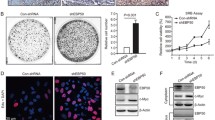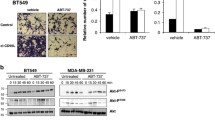Abstract
Transcriptionally active p63 (TAp63) promotes cell cycle arrest, senescence, and apoptosis in several cancer cells. Migration inhibitory factor (MIF)/CD74 regulates B-cell survival through nuclear factor (NF)-κB-dependent TAp63 expression. In this study, we investigated how the level of TAp63 expression influences the induction of apoptosis in baicalein-treated EBV-transformed B cells. Baicalein induced the expression of TAp63 and apoptosis signal-regulating kinase 1 (ASK1), as well as cytotoxicity, by disrupting the mitochondrial membrane and inhibiting the activation of phosphoinositide 3-kinase (PI3K)/Akt and NF-κB. Genetic knockdown of TAp63 or ASK1 by small interfering RNA resulted in protection from apoptosis accompanied by the recovery of CD74, CD44, α4 integrin, Bcl-2, and NF-κB activation. Baicalein-induced reactive oxygen species activated the ASK1/JNK pathway with subsequent expression of TAp63. Pre-engagement with MIF/CD74 maintained the expression of CD74, CD44, and α4 integrin, as well as Syk/Src-mediated PI3K/Akt activation, in baicalein-treated EBV-transformed B cells. Meanwhile, ASK1/JNK-dependent TAp63 expression was efficiently suppressed after pre-treatment with MIF. Our results suggest that baicalein-mediated ASK1/JNK activation regulates the mitochondria-dependent apoptosis pathway through the up-regulation of TAp63 and down-regulation of NF-κB and CD74/CD44 in B-cell malignancies.





Similar content being viewed by others
Abbreviations
- 7-AAD:
-
7-Aminoactinomycin D
- APDC:
-
4-Amino-2,4-pyrrolidine-dicarboxylic acid
- ASK1:
-
Apoptosis signal-regulating kinase 1
- Cyt. c:
-
Cytochrome c
- DCF:
-
2979-Dichlorofluorescein
- DCFH-DA:
-
29,79-Dichlorodihydrofluorescein diacetate
- DiOC6:
-
3,39-Dihexyloxacarboxyanine iodide
- EBV:
-
Epstein–Barr virus
- EtOH:
-
Ethanol
- GADD34:
-
Growth arrest and DNA damage-inducible protein 34
- GADD45:
-
Growth arrest and DNA damage protein 45
- IP:
-
Immunoprecipitation
- ΔΨm:
-
Mitochondrial membrane potential
- MIF:
-
Macrophage migration inhibitory factor
- NAC:
-
N-acetylcysteine
- PARP:
-
Poly(ADP-ribose) polymerase
- ROS:
-
Reactive oxygen species
- siRNA:
-
Small interfering RNA
- TAp63:
-
Transcriptionally active p63
- TAp73:
-
Transcriptionally active p73
- z-DEVD-fmk:
-
N-benzyloxycarbonyl-Asp-Glu-Val-Asp-fluoromethylketone
- z-IETDfmk:
-
N-benzyloxycarbonyl-Ile-Glu-Thr-Asp-fluoromethylketone
- z-LEHD-fmk:
-
z-Leu-Glu(OMe)-His-Asp-(OMe)-fluoromethylketone
References
Burton JD, Ely S, Reddy PK, Stein R, Gold DV, Cardillo TM et al (2004) CD74 is expressed by multiple myeloma and is a promising target for therapy. Clin Cancer Res 10:6606–6611
Cresswell P (1994) Assembly, transport, and function of MHC class II molecules. Annu Rev Immunol 12:259–293
Matza D, Wolstein O, Dikstein R, Shachar I (2001) Invariant chain induces B cell maturation by activating a TAF(II)105-NF-kappaB-dependent transcription program. J Biol Chem 276:27203–27206
Jacobs WB, Govoni G, Ho D, Atwal JK, Barnabe-Heider F, Keyes WM et al (2005) p63 is an essential proapoptotic protein during neural development. Neuron 48:743–756
Sapoznikov A, Pewzner-Jung Y, Kalchenko V, Krauthgamer R, Shachar I, Jung S (2008) Perivascular clusters of dendritic cells provide critical survival signals to B cells in bone marrow niches. Nat Immunol 9:388–395
Shachar I, Haran M (2011) The secret second life of an innocent chaperone: the story of CD74 and B cell/chronic lymphocytic leukemia cell survival. Leuk Lymphoma 52:1446–1454
Binsky I, Lantner F, Grabovsky V, Harpaz N, Shvidel L, Berrebi A et al (2010) TAp63 regulates VLA-4 expression and chronic lymphocytic leukemia cell migration to the bone marrow in a CD74-dependent manner. J Immunol 184:4761–4769
Chen CH, Huang LL, Huang CC, Lin CC, Lee Y, Lu FJ (2000) Baicalein, a novel apoptotic agent for hepatoma cell lines: a potential medicine for hepatoma. Nutr Cancer 38:287–295
Pidgeon GP, Kandouz M, Meram A, Honn KV (2002) Mechanisms controlling cell cycle arrest and induction of apoptosis after 12-lipoxygenase inhibition in prostate cancer cells. Cancer Res 62:2721–2727
Bonham M, Posakony J, Coleman I, Montgomery B, Simon J, Nelson PS (2005) Characterization of chemical constituents in Scutellaria baicalensis with antiandrogenic and growth-inhibitory activities toward prostate carcinoma. Clin Cancer Res 11:3905–3914
Chao JI, Su WC, Liu HF (2007) Baicalein induces cancer cell death and proliferation retardation by the inhibition of CDC2 kinase and survivin associated with opposite role of p38 mitogen-activated protein kinase and AKT. Mol Cancer Ther 6:3039–3048
Zhou J, Fariss RN, Zelenka PS (2003) Synergy of epidermal growth factor and 12(S)-hydroxyeicosatetraenoate on protein kinase C activation in lens epithelial cells. J Biol Chem 278:5388–5398
Agarwal S, Achari C, Praveen D, Roy KR, Reddy GV, Reddanna P (2009) Inhibition of 12-LOX and COX-2 reduces the proliferation of human epidermoid carcinoma cells (A431) by modulating the ERK and PI3K-Akt signalling pathways. Exp Dermatol 18:939–946
Huang Y, Hu J, Zheng J, Li J, Wei T, Zheng Z, Chen Y (2012) Down-regulation of the PI3K/Akt signaling pathway and induction of apoptosis in CA46 Burkitt lymphoma cells by baicalin. J Exp Clin Cancer Res 20(31):48
Starlets D, Gore Y, Binsky I, Haran M, Harpaz N, Shvidel L et al (2006) Cell-surface CD74 initiates a signaling cascade leading to cell proliferation and survival. Blood 107:4807–4816
Stein R, Mattes MJ, Cardillo TM, Hansen HJ, Chang CH, Burton J et al (2007) CD74: a new candidate target for the immunotherapy of B-cell neoplasms. Clin Cancer Res 13(18 Pt 2):5556s–5563s
Griffiths GL, Mattes MJ, Stein R, Govindan SV, Horak ID, Hansen HJ et al (2003) Cure of SCID mice bearing human B-lymphoma xenografts by an anti-CD74 antibody-anthracycline drug conjugate. Clin Cancer Res 9:6567–6571
Stein R, Gupta P, Chen X, Cardillo TM, Furman RR, Chen S, Chang CH, Goldenberg DM (2010) Therapy of B-cell malignancies by anti-HLA-DR humanized monoclonal antibody, IMMU-114, is mediated through hyperactivation of ERK and JNK MAP kinase signaling pathways. Blood 115:5180–5190
Park GB, Kim YS, Lee HK, Song H, Cho DH, Lee WJ et al (2010) Endoplasmic reticulum stress-mediated apoptosis of EBV-transformed B cells by cross-linking of CD70 is dependent upon generation of reactive oxygen species and activation of p38 MAPK and JNK pathway. J Immunol 185:7274–7284
Wang N, Tang LJ, Zhu GQ, Peng DY, Wang L, Sun FN et al (2008) Apoptosis induced by baicalin involving up-regulation of P53 and bax in MCF-7 cells. J Asian Nat Prod Res 10:1129–1135
Lantner F, Starlets D, Gore Y, Flaishon L, Yamit-Hezi A, Dikstein R et al (2007) CD74 induces TAp63 expression leading to B-cell survival. Blood 110:4303–4311
Shi X, Leng L, Wang T, Wang W, Du X, Li J et al (2006) CD44 is the signaling component of the macrophage migration inhibitory factor-CD74 receptor complex. Immunity 25:595–606
Furuhata M, Takada E, Noguchi T, Ichijo H, Mizuguchi J (2009) Apoptosis signal-regulating kinase (ASK)-1 mediates apoptosis through activation of JNK1 following engagement of membrane immunoglobulin. Exp Cell Res 315:3467–3476
Gore Y, Starlets D, Maharshak N, Becker-Herman S, Kaneyuki U, Leng L, Bucala R, Shachar I (2008) Macrophage migration inhibitory factor induces B cell survival by activation of a CD74-CD44 receptor complex. J Biol Chem 283:2784–2792
Wu G, Nomoto S, Hoque MO, Dracheva T, Osada M, Lee CC et al (2003) DeltaNp63alpha and TAp63alpha regulate transcription of genes with distinct biological functions in cancer and development. Cancer Res 63:2351–2357
Ratovitski EA, Patturajan M, Hibi K, Trink B, Yamaguchi K, Sidransky D (2001) p53 associates with and targets Delta Np63 into a protein degradation pathway. Proc Natl Acad Sci USA 98:1817–1822
Alinari L, Yu B, Christian BA, Yan F, Shin J, Lapalombella R et al (2011) Combination anti-CD74 (milatuzumab) and anti-CD20 (rituximab) monoclonal antibody therapy has in vitro and in vivo activity in mantle cell lymphoma. Blood 117:4530–4541
Kunisaki R, Ikawa S, Maeda T, Nakazaki Y, Kurita R, Harata M et al (2006) p51/p63, a novel p53 homologue, potentiates p53 activity and is a human cancer gene therapy candidate. J Gene Med 8:1121–1130
Du W, Wright BM, Li X, Finke J, Rini BI, Zhou M et al (2013) Tumor-derived macrophage migration inhibitory factor promotes an autocrine loop that enhances renal cell carcinoma. Oncogene 32:1469–1474
Davidson HW, Reid PA, Lanzavecchia A, Watts C (1991) Processed antigen binds to newly synthesized MHC class II molecules in antigen-specific B lymphocytes. Cell 67:105–116
Malfuson JV, Boutin L, Clay D, Thépenier C, Desterke C, Torossian F et al (2014) SP/drug efflux functionality of hematopoietic progenitors is controlled by mesenchymal niche through VLA-4/CD44 axis. Leukemia 28:853–864
Jacamo R, Chen Y, Wang Z, Ma W, Zhang M, Spaeth EL et al (2014) Reciprocal leukemia-stroma VCAM-1/VLA-4-dependent activation of NF-κB mediates chemoresistance. Blood 123:2691–2702
Humphries LA, Godbersen JC, Danilova OV, Kaur P, Christensen BC, Danilov AV (2013) Pro-apoptotic TP53 homolog TAp63 is repressed via epigenetic silencing and B-cell receptor signalling in chronic lymphocytic leukaemia. Br J Haematol 163:590–602
Tobiume K, Matsuzawa A, Takahashi T, Nishitoh H, Morita K, Takeda K et al (2001) ASK1 is required for sustained activations of JNK/p38 MAP kinases and apoptosis. EMBO Rep 2:222–228
Wu J, Bergholz J, Lu J, Sonenshein GE, Xiao ZX (2010) TAp63 is a transcriptional target of NF-kappaB. J Cell Biochem 109:702–710
Barbieri CE, Tang LJ, Brown KA, Pietenpol JA (2006) Loss of p63 leads to increased cell migration and up-regulation of genes involved in invasion and metastasis. Cancer Res 66:7589–7597
Lu C, Lu S, Liang W, Li J, Dou X, Bian C et al (2011) TAp63α mediates chemotherapeutic agent-induced apoptosis in human bone marrow mesenchymal stem cells. Stem Cells Dev 20:1319–1326
Gressner O, Schilling T, Lorenz K, Schulze Schleithoff E, Koch A, Schulze-Bergkamen H et al (2005) TAp63alpha induces apoptosis by activating signaling via death receptors and mitochondria. EMBO J 24:2458–2471
Acknowledgments
This work was supported by the National R&D Program for Cancer Control, Ministry for Health, Welfare and Family Affairs, Republic of Korea (Grant #: 0920040) and Grant from the Korea Healthcare Technology R&D Project of the Ministry of Health and Welfare Affairs, Republic of Korea (Grant#: HI12C0005).
Author information
Authors and Affiliations
Corresponding authors
Ethics declarations
Conflict of interest
The authors declare that they have no conflicts of interest to disclose.
Electronic supplementary material
Below is the link to the electronic supplementary material.
Rights and permissions
About this article
Cite this article
Park, G.B., Kim, Y.S., Lee, HK. et al. ASK1/JNK-mediated TAp63 activation controls the cell survival signal of baicalein-treated EBV-transformed B cells. Mol Cell Biochem 412, 247–258 (2016). https://doi.org/10.1007/s11010-015-2631-8
Received:
Accepted:
Published:
Issue Date:
DOI: https://doi.org/10.1007/s11010-015-2631-8




